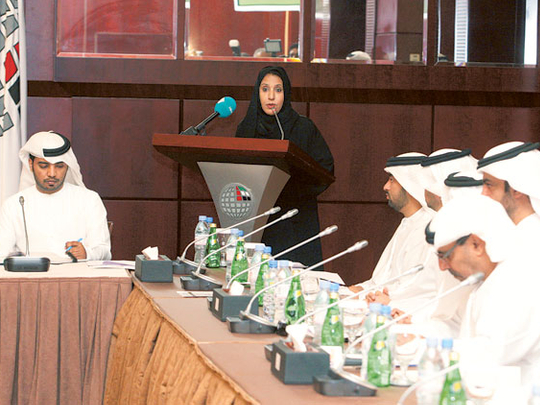
Abu Dhabi: The media has a crucial role in fostering the UAE’s national identity and social cohesion by inculcating pride in Emirati culture, loyalty and hard work in young citizens, a round table discussion was told yesterday (Wednesday).
Officials, academics and media professionals gathered to discuss issues related to the role and social responsibility of the media, other educational institutions and authorities in cementing national identity and social cohesion among citizens in the era of globalisation.
“Our goal should be to groom a generation that takes pride in national identity and works hard to preserve it,” Dr Maitha Al Shamsi, Minister of State, told the gathering organised by the National Media Council, in cooperation with the Journalists Association and the Emirates Centre for Strategic Studies..
Stressing that social cohesion, family stability, and national identity are top priorities of the UAE Government, Dr Maitha said empowerment of Emiratis, especially in the media, was a great goal to achieve development in all spheres.
“We need a plan on which we all work to identify the role of the media in achieving goals on my agenda and see where is my agenda in the media content,” Dr Maitha said.
Dr Mariam Lootah, assistant professor of political science at UAE University, said cultural diversity of the UAE community should not adversely affect the Emirati culture – the foundation for security and stability.
“The UAE, like other nations, has concerns related to national identity. The French, German, Japanese and Indians all share these concerns over their national identities. But we can interact positively with other cultures and not surrender to them,” Dr Mariam said.
Dr Mariam urged concerted efforts by the media, educational and religious institutions to address challenges posed by globalisation, imbalance in the population structure and Arab uprisings. ‘We all share responsibility, including the school, scholars, media professionals, the families and the government to face up to these challenges,” Dr Mariam said.
Dr Mariam reminded Emirati intellectuals and media professionals of their responsibility towards their nation, urging them to promote community cohesion, preserve the UAE national identity, and encourage an inclusive environment that integrates all segments of society while upholding the unique culture, heritage and traditions of the UAE.
Dr Mariam called on the media to foster the national identity by preserving and propagating the use of the Arabic language, promoting the UAE’s culture, heritage and tradition, embedding values of religious moderation, and encouraging and promoting authentic UAE principles.
Dr Hassan Qayed, professor of mass communication at UAE University, said television has the greatest influence on its audience in the UAE, urging authorities to focus on the instigators and the message they pass on to the audience.
Dr Qayed said : “We need a real Emiratisation in the media, not artificial like what is taking place in the banking sector. Our graduates are victims of injustice being practised by many organisations.”
Aisha Sultan, an Emirati columnist, said the culture of hard work must be instilled in young Emiratis. “They should be advised to take on small jobs and then move on to better openings and bigger salaries.”












